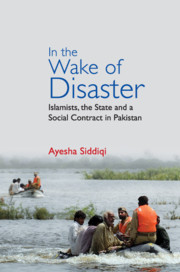Book contents
- Frontmatter
- Dedication
- Contents
- List of Figures, Boxes and Tables
- Acknowledgements
- Introduction: Setting the Scene
- 1 A Social Contract: State–Citizen Relations and Unfolding Disasters
- 2 The State as a Complex Web of Social Relations
- 3 The Ethnographic Social Contract
- 4 Advancing ‘Disaster Citizenship’
- 5 The Failing ‘Islamist Takeover’ in the Aftermath of the Indus Floods
- Conclusion: Disasters and the State–Citizen Relationship
- References
- Index
3 - The Ethnographic Social Contract
Published online by Cambridge University Press: 24 April 2019
- Frontmatter
- Dedication
- Contents
- List of Figures, Boxes and Tables
- Acknowledgements
- Introduction: Setting the Scene
- 1 A Social Contract: State–Citizen Relations and Unfolding Disasters
- 2 The State as a Complex Web of Social Relations
- 3 The Ethnographic Social Contract
- 4 Advancing ‘Disaster Citizenship’
- 5 The Failing ‘Islamist Takeover’ in the Aftermath of the Indus Floods
- Conclusion: Disasters and the State–Citizen Relationship
- References
- Index
Summary
Evidence from my fieldwork in three districts in lower Sindh, presented in the previous chapter, suggests that people exercise more agency than structuralist accounts of the state in Pakistan have given them credit for. If kinship networks and clientalistic relations with a political patron, such as a powerful wadera, defined people's only interaction or understanding of the state, Dr Zulfiqar Mirza would not have been able to gain political prominence in Badin district. Similarly, if it was just the Sheerazi family's pir background that resulted in their rise to power in Thatta, they could potentially also have been voted out of office like other ‘quintessential “feudal lord(s)”’, such as Mustafa Khar or Nawabzada Iftikhar Ahmed, who have lost elections in recent years (Akhtar 2012). It is evident that there is more to people's relationship and understanding of the state beyond pirs and biraderis in Pakistan. If not through hierarchical social relations or, to quote Mohmand, as ‘patrons, brothers and landlords’ (2011), how then do people construct the state, citizenship and the relationship between them?
This chapter answers these questions by using anthropological tools to interrogate what the state means ‘from below’. This is then complemented by an interrogation of citizenship ‘from below’ in order to understand the wider state–citizen relations in Pakistan. Does a citizenship framework hold any meaning for people and how do they see their rights and responsibilities as citizens of this state? Studies on citizenship in Pakistan have concluded that the concept does not exist in the political imagination of people. An explanation that is often provided for this shortcoming is that the state has failed to provide a framework or foundation on which citizenship can be built (Kabeer et al. 2012). Instead, the focus of the state has been an exclusionary religious foundation that ‘seeks to create practicing Muslims rather than democratic citizens’ (Ahmad 2004, 39; also see Lall 2012b, Dean 2005, Leirvik 2008). This work generally builds upon definitions and understanding of ‘universal’ citizenship often problematised for being context-specific. Yet much of the work emphasising the failure of the Pakistani state to build a framework for citizenship, or participatory democratic citizens, has been developed using European liberal ideals considered ‘universal’ that have very little flexibility built into them (Delanty 1997).
- Type
- Chapter
- Information
- In the Wake of DisasterIslamists, the State and a Social Contract in Pakistan, pp. 70 - 102Publisher: Cambridge University PressPrint publication year: 2019



